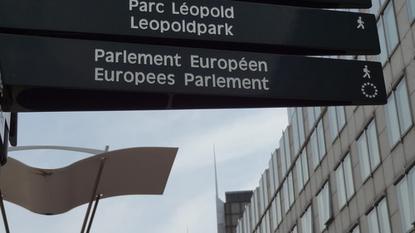Europe prepares to enforce its take on net neutrality
- 10 July, 2015 02:34

Sign showing the way to the European Parliament in Brussels on June 17, 2015
European Union citizens got their first look at draft net neutrality laws on Wednesday, more than a week after the European Parliament and the Council of the EU reached an agreement. Digital rights activists are guardedly optimistic about the guarantees it offers for access to an open Internet.
Only the Netherlands and Slovenia have clear rules on net neutrality today, leaving most Europeans without a guaranteed right to access the open Internet. The draft law published Wednesday after years of negotiations between the EU's three legislative bodies -- the Parliament, Commission and Council -- aims to guarantee access to online content and services without any discrimination of traffic by Internet access providers.
The text was agreed to early last week -- but then changed again on Friday, with some tweaks to the articles of the law and some bigger changes to the explanatory notes, called recitals.
The latest changes establish a clear net neutrality provision, even though the term itself isn't used in the text, said Estelle Massé, policy analyst at digital rights group Access Now.
The new article 3.3 now reads: "Providers of internet access services shall treat all traffic equally, when providing internet access services, without discrimination, restriction or interference, and irrespective of the sender and receiver, the content accessed or distributed, the applications or services used or provided, or the terminal equipment used."
Its scope had previously been limited, but now the whole definition of net neutrality comes back into play, according to Joe McNamee, executive director of EDRi, another digital rights group.
Massé also said that the negotiations had closed a loophole that would have allowed commercial services to buy priority access over the European Internet. Such prioritization of Internet services is no longer allowed by the draft.
Agreements on services optimized for specific content will still be allowed where optimization is necessary, but operators will have to ensure the general quality of Internet access services, according to the draft. Such specialized services could include telesurgery or connected vehicles, according to the Council of the EU.
Operators are allowed to use reasonable traffic management measures to keep the Internet running -- but such measures must be based on objective technical requirements, not on commercial considerations. Blocking or throttling will be allowed only in a limited number of circumstances, for instance to deal with exceptional or temporary traffic congestion or to counter cyber-attacks.
While Access Now and EDRi see the latest text as an improvement, Massé and McNamee would both have liked to see a ban on "zero-rating," in which a mobile operator allows subscribers to access a site or service for free, without counting it towards their data allowance, perhaps because the site is paying the operator to promote it. Such deals would give services an advantage over their competitors, they say.
The term's absence from the draft could open the way for countries to ban zero-rating of their own accord, said Marietje Schaake, a Dutch Member of the European Parliament.
The rights groups also regretted a lack of clarity in parts of the text. As an EU regulation, it will enter into force almost immediately after its final approval, replacing national law in the areas it covers. It will be up to national regulators to enforce the law. However, "a big part of the text" lacks clarity and would need to be interpreted by the authorities, said Massé, who is concerned that national regulators could interpret the text differently from one another.
Now the Council has formally approved the draft, Parliament must give its formal approval -- and may try to change the text again. Schaake said she would try to add a ban on zero-rating, though she said that at this stage that would be hard to do.
Next week the document will be discussed in the Industry Research and Energy Committee, and Parliament is expected to give a final vote on the text in the autumn.
Loek is Amsterdam Correspondent and covers online privacy, intellectual property, online payment issues as well as EU technology policy and regulation for the IDG News Service. Follow him on Twitter at @loekessers or email tips and comments to loek_essers@idg.com
